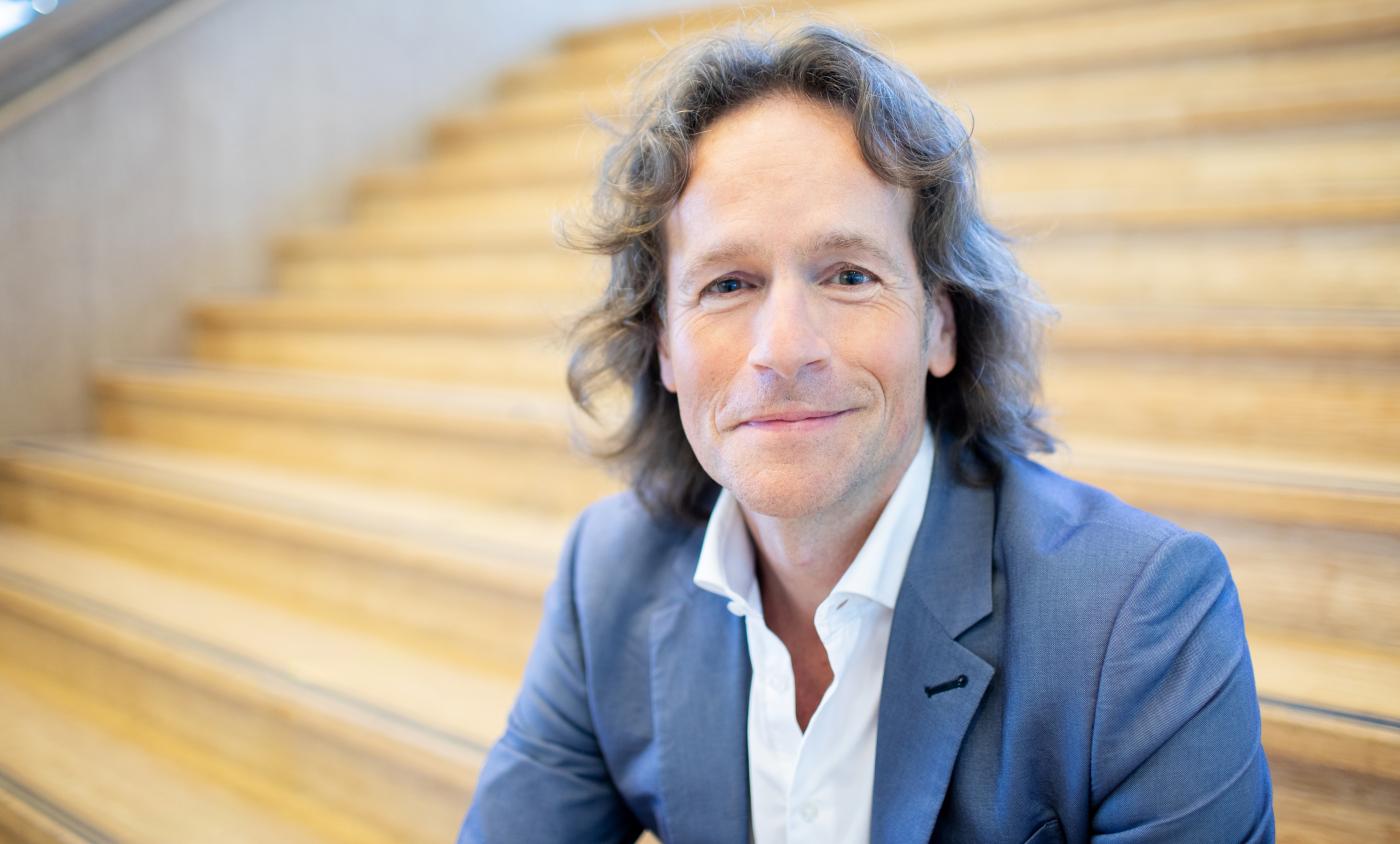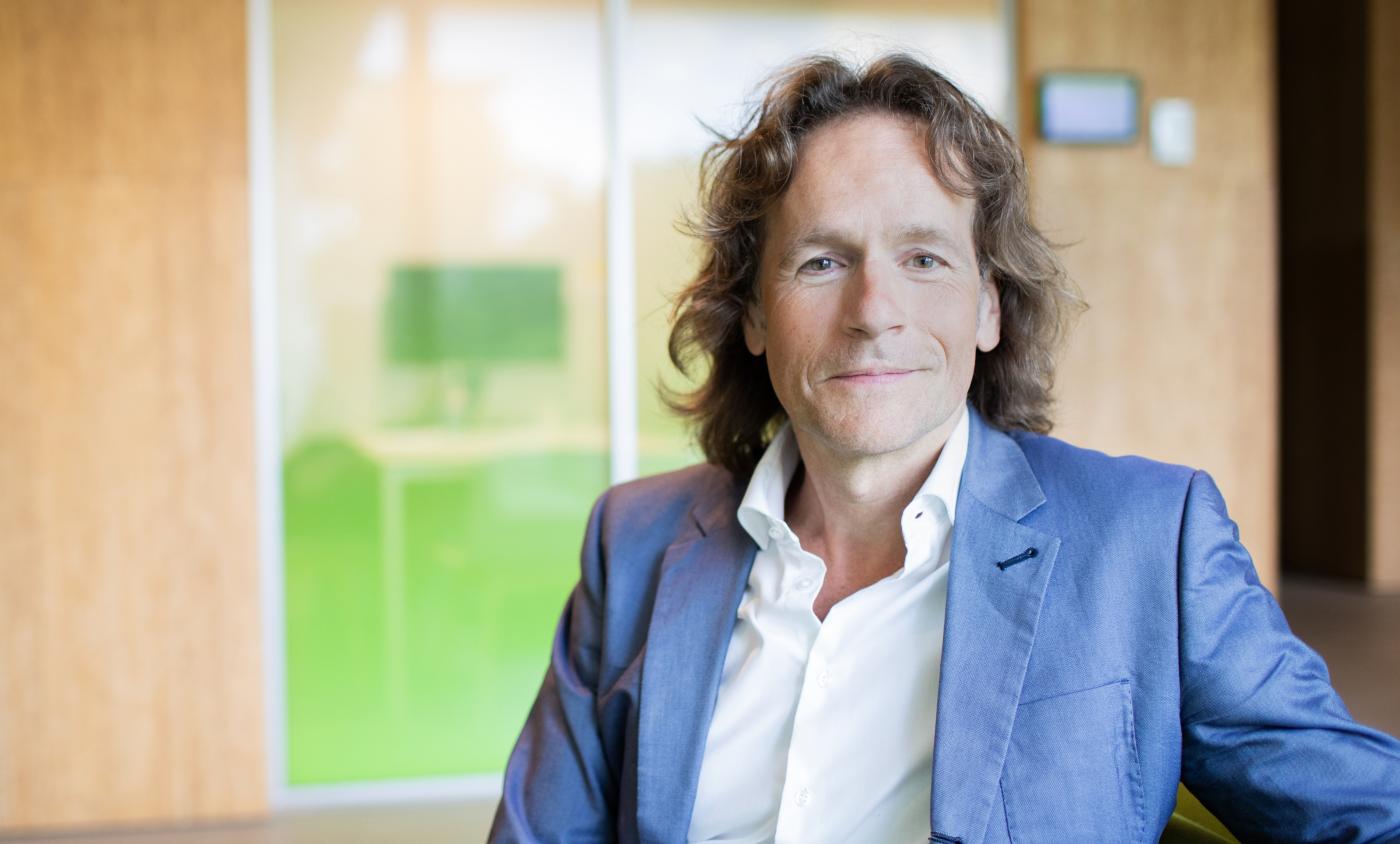All-rounder Ralph Meulenbroeks appointed Professor of Scientific Literacy
‘All you need is a genuine desire to learn’

At the age of three, Ralph Meulenbroeks already spent whole days with his nose stuck in a book. As a young boy, he would read books about the universe from cover to cover and could often be found at the library in Riethoven, the village in Brabant where he grew up.
Later, he also learned to play the guitar and piano that his parents had at home. He also tinkered with bicycles, homemade miniature aeroplanes, and a combustion engine he designed himself. 'My father had a welding machine, and my brother and I were used to hanging bicycles on the garage ceiling and repairing them ourselves."
As a teenager, Meulenbroeks played in a hard rock band. He saved money to buy his bass guitar by picking beans. When he saw a double bass at his guitar teacher's house, it became his second great love. He bought one after another summer of bean picking, which even led him to study double bass at the conservatory alongside his studies in Physics and subsequent PhD in plasma physics at Eindhoven University of Technology.
He worked as a bassist for the Concertgebouw Orchestra for a year, where he discovered his next great love: the viola da gamba, a cross between a guitar and a violin. He travelled the world for nine years as a professional musician and recorded fifteen CDs, one of which was awarded the Edison Classical Audience Award.
'I've always had a very broad range of interests,' he says. That sounds like an understatement for someone who is also an advanced tai chi practitioner and has a pilot's licence.
Motivation is key
He gave up his full-time music career after suffering from tendonitis. That's when he went for another love: education. After four ‘wonderful years’ teaching Physics at a secondary school in Bilthoven, he was asked by Utrecht University to teach at the teacher training college for science subjects.
He also started a popular YouTube channel in which he explains Physics for upper secondary school students, and he set up a transition programme for aspiring science teachers called bèta4all. In addition, he is now the chair of Freudenthal Institute.
Meulenbroeks discovered that autonomous motivation is the key to teaching students. '' I think motivation theory is a wonderful vehicle for thinking about why people do things and why they do the work they do. Is it just because they want to earn money? Is it because of their ego? Is it because they want to contribute something to the world? Or is it simply because they enjoy it?'
Financial motivation alone does not seem to be a healthy path, according to motivation theory. 'You see it with pop bands, for example. They enjoy making music and have a lot of fun. The first album is a huge success. Then they have to make a second album, and that's when the trouble starts. Suddenly, there's a record company, fans with high expectations, and band members wanting to earn more money. Then the second album flops, and it's not as fun anymore. That's hard to fix.'
Limits to science
Motivation is therefore a key concept in his research into scientific literacy, for which he was appointed professor on March 1. How does one encourage people to want to learn things for themselves?
'The philosopher John Dewey wrote in the 1930s that when a society has become complex, it is no longer enough to learn from your parents what to do. At this point, formal education becomes necessary. If you can't read and write, you can't participate. But it's also about being able to read and interpret graphs, formulas, symbols and maps, for example. That is the core of scientific literacy. In the 1950s, when the Soviet Union beat the US into space with its Sputnik rocket, the Americans were not amused, so they decided that they needed more scientists.'
'You could call that the first vision of scientific literacy: training as many scientists as possible. But, in the 1970s and 1980s, when we had the Vietnam War, the nuclear disaster on Long Island, and environmental pollution, people realised that there are limits to science. You must also be able to think about what science does to society. Everyone in a country should be equipped to contribute to the debate on a particular issue, such as whether or not we want to use nuclear energy. This requires a different, broader view of scientific literacy.'
Meulenbroeks adds that a third view on scientific literacy has recently emerged, and it is causing much debate. This view states that if people live in a democratic and technological society, they must also take action based on their scientific insights. This also applies to scientists. 'Should scientists themselves call for action? I often discuss this with my colleague Erik van Sebille. He thinks so, but I'm not sure yet.'

Grenzen aan de wetenschap
Motivatie is dan ook een kernbegrip in zijn onderzoek naar wetenschappelijke geletterdheid, waarvoor hij sinds 1 maart als hoogleraar is benoemd. Hoe stimuleer je mensen zodat ze zelf dingen willen weten?
“De filosoof John Dewey schreef in de jaren dertig van de vorige eeuw al dat wanneer een samenleving complex is geworden, het niet meer volstaat om alleen maar bij je ouders af te kijken wat je moet doen. Dan is ‘formele’ scholing nodig. Als je niet kunt lezen en schrijven, dan kun je niet meedoen."
“Maar het gaat bijvoorbeeld ook om het kunnen lezen en interpreteren van grafieken, formules, symbolen en kaarten. Dat is de kern van wetenschappelijke geletterdheid. In de jaren 50, toen de Sovjetunie met zijn Spoetnik-raket eerder in de ruimte was dan de VS, waren de Amerikanen not amused, waarop ze besloten: we hebben meer wetenschappers nodig."
“Dat zou je de eerste visie op wetenschappelijke geletterdheid kunnen noemen: zoveel mogelijk wetenschappers opleiden. Maar in de jaren 70 en 80, toen we de Vietnamoorlog hadden, de kernramp op Long Island en milieuvervuiling, werd duidelijk: er zijn ook grenzen aan de wetenschap. Je moet ook kunnen nadenken wat wetenschap doet met de maatschappij. Alle mensen in een land moeten kunnen meedenken over een thema, bijvoorbeeld: willen we kernenergie? Daarvoor heb je een andere, bredere kijk op wetenschappelijke geletterdheid nodig.”
Daarnaast is er recent een derde visie op wetenschappelijke geletterdheid ontstaan, die veel discussie oproept, vertelt Meulenbroeks. Die visie zegt dat als mensen in een democratische en technologische maatschappij leven, dat ze dan ook actie moeten ondernemen op basis van hun eigen wetenschappelijke inzichten. Dat geldt dan ook voor wetenschappers.
“Moeten wetenschappers zelf oproepen tot actie? Ik heb daar vaak discussie over met collega Erik van Sebille. Hij vindt van wel, maar ik ben er nog niet over uit.”
AI-free space
Scientific literacy, in whatever form, is of great importance to society, but how do you ensure that people acquire it? The advent of AI has made it much easier to find information, but are people learning from it?'
'I used to have to make an effort to find books. I had to go to a library with a limited collection. Now, if I want to know something about general relativity theory, all I have to do is ask AI, and it will neatly spoon-feed me the information. The only thing it requires is wanting to know.'
The university's new educational model, which also sets goals for students, conflicts with the use of AI in education. 'We want our students to be independent thinkers, work independently, be boundary-crossing, think ethically and reflect, but we cannot achieve those goals in a situation where AI is always present.'
To Meulenbroeks, it is not yet clear how this should be done. 'While brainstorming with a colleague, we came up with the idea that we might need to create spaces in education where AI is completely absent. On the other hand, I think you also need to create space to learn how to deal with AI.'
Viola da gamba
Despite his ever-changing passions, Meulenbroeks has not yet said goodbye to his viola da gamba. He still plays it every day, often gives concerts and plays solos in performances of the St Matthew Passion.
'Playing in an orchestra requires a completely different kind of concentration than working as a scientist. As a musician, a concert is the most exciting thing you can experience. In the St Matthew Passion, my solos begin at a precise point in the piece, indicated by the conductor, and not a second before or after. You are completely in the moment. That requires a lot of energy, but it is also very relaxing in a way.'
Comments
We appreciate relevant and respectful responses. Responding to DUB can be done by logging into the site. You can do so by creating a DUB account or by using your Solis ID. Comments that do not comply with our game rules will be deleted. Please read our response policy before responding.